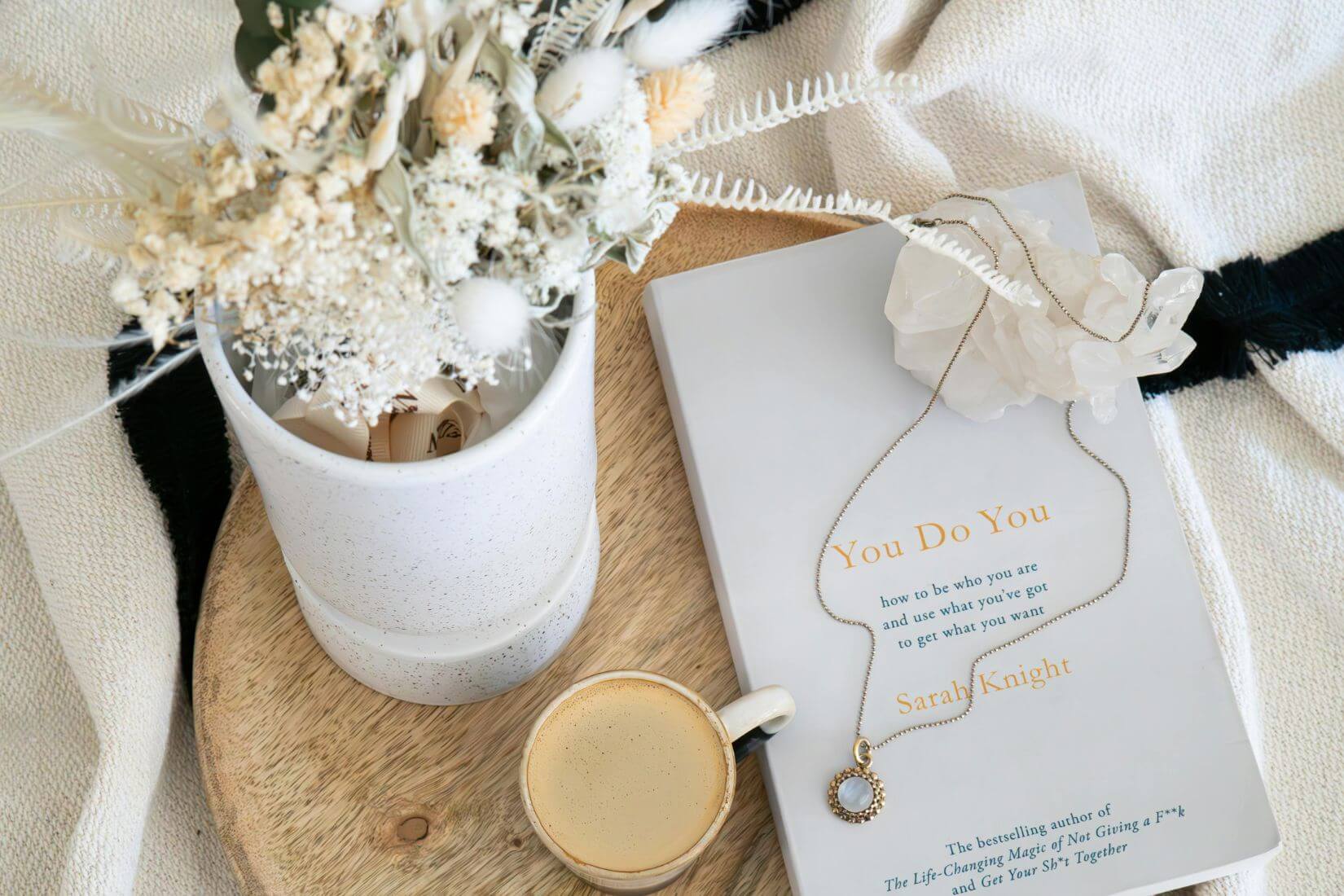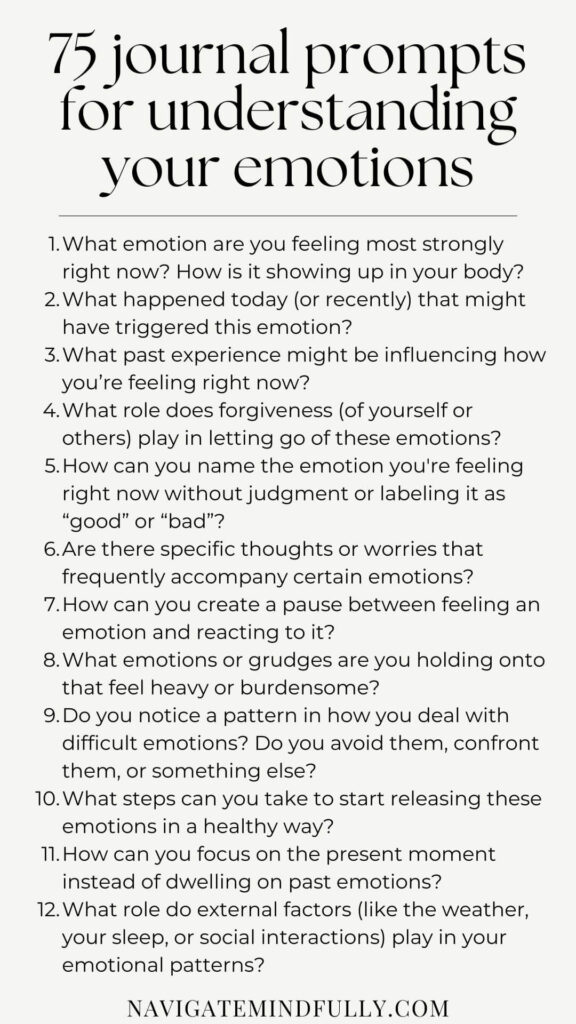75 Journal Prompts to Understand Your Emotions
Emotions can be tricky, right? One minute you’re on top of the world, and the next, you’re stuck in a whirlwind of frustration, sadness, or stress. It’s easy to get lost in the ups and downs, and sometimes it feels like understanding your emotions is just out of reach.
Still, understanding your emotions is crucial. After all, they affect how you relate to yourself, others, and the world around you. And let’s be real – burying your feelings under Netflix binges and endless scrolling only works for so long.
But there’s good news. All you need is a journal, a pen, and journal prompts to understand your emotions, so you can start untangling those emotions and actually make sense of them.
So, let’s dive in – it’s simpler than you think, and you might even be surprised by what you uncover.
How Journaling Helps You Understand Your Emotions
We’ve all been feeling overwhelmed by emotions and not knowing where to start. Maybe you’ve tried to ignore them, distract yourself, or even bottle them up, but, that rarely works in the long run. Journaling, on the other hand, can be an absolute game-changer when it comes to making sense of your feelings.
Journaling makes you slow down, reflect, and actually process what’s going on in your head. It’s like having a conversation with yourself, but with no filters, no judgment, just pure honesty.
Plus, there’s actual science behind this – writing activates parts of your brain that help you process emotions more clearly. You’re not just reacting to how you feel anymore, but you’re starting to understand why you feel that way. And then it’s much easier to manage those emotions, instead of letting them control you.
If you want to get some clarity, journaling might just be the right practice for you. And, you don’t need hours of free time – just a few minutes a day to check in with yourself and see what’s really going on under the surface.

75 Journal Prompts to Understand Your Emotions
Identifying Your Current Emotions
- What emotion are you feeling most strongly right now? How is it showing up in your body?
- What happened today (or recently) that might have triggered this emotion?
- How does this emotion affect your thoughts and actions?
- If you had to name three other emotions you’re feeling right now, what would they be?
- What thoughts come to mind when you think about this emotion? Are they helpful or harmful?
- Do you feel like this emotion is familiar? When was the last time you felt this way?
- Are you avoiding any emotions? Why do you think that is?
- What do you need right now to help you process this emotion?
- What does this emotion want you to know or understand about yourself?
- How would you describe this emotion if it were a person? What would it say to you?
- What is the underlying cause of this emotion – stress, fear, excitement, or something else?
- Are there any unmet needs or desires fueling this emotion?
- How do you typically react when this emotion comes up? Is it a reaction you’re proud of?
- What would your ideal response to this emotion look like?
- How can you practice self-compassion while feeling this emotion?
Exploring the Root Causes of Your Emotions
- What past experience might be influencing how you’re feeling right now?
- Is this emotion tied to a specific belief or assumption you have about yourself or others?
- What expectations do you have that might be contributing to this emotion?
- Are you reacting to the situation in front of you, or is this a reaction to something from your past?
- How would your younger self handle this emotion? How has your reaction changed over time?
- Are there certain people or situations that consistently trigger this emotion for you? Why do you think that is?
- Do you think this emotion is based on reality, or could it be influenced by fears or insecurities?
- What stories are you telling yourself about this emotion? Are they helpful or hurtful?
- Is there a pattern to when and how this emotion shows up in your life?
- How did your family or childhood environment shape the way you deal with this emotion?
- What unmet needs are connected to this emotion? Is there something you’re longing for?
- Are you feeling this emotion as a way to protect yourself from something deeper?
- What part of your identity might be tied to this emotion? How does it shape how you see yourself?
- What assumptions are you making about the situation that might be fueling this emotion?
- If you could go back in time, what would you change about how you first learned to handle this emotion?

Understanding Emotional Patterns
- What emotions do you tend to feel most often? Why do you think these are your most common emotions?
- Do certain situations or environments consistently trigger strong emotions in you?
- What time of day or part of your week do you notice certain emotions showing up the most?
- Is there a pattern in how you respond to stress? What emotion do you tend to feel first?
- How do your emotions change throughout the day? Are there specific moments when certain feelings emerge?
- What role do external factors (like the weather, your sleep, or social interactions) play in your emotional patterns?
- Are there particular relationships in your life that consistently trigger the same emotions?
- Do you notice a pattern in how you deal with difficult emotions? Do you avoid them, confront them, or something else?
- When you reflect on the past month, what emotional highs and lows stand out?
- Do you feel certain emotions more strongly in specific places (home, work, social settings)?
- When you feel an emotion repeatedly, what actions do you typically take (or avoid)?
- Are there specific thoughts or worries that frequently accompany certain emotions?
- Do you tend to react the same way to similar emotional triggers, or do your reactions change over time?
- What emotions tend to last the longest for you, and why do you think they linger?
- If you look at your emotional patterns, are there any emotions you’d like to experience more or less?
Cultivating Emotional Intelligence
- How can you name the emotion you’re feeling right now without judgment or labeling it as “good” or “bad”?
- What is this emotion trying to teach you about yourself or your current situation?
- How can you create a pause between feeling an emotion and reacting to it?
- What are some healthy ways you could express this emotion to someone else?
- When was the last time you acted on your emotions in a way that you felt proud of? What did you do differently?
- How can you be more aware of your emotional triggers without letting them control you?
- When you feel overwhelmed by emotions, how can you ground yourself and regain balance?
- How can you communicate your emotions more clearly to others without placing blame or guilt?
- What tools or strategies have helped you manage difficult emotions in the past? How can you apply them now?
- How can you show compassion to yourself when you’re feeling strong or negative emotions?
- What would it look like to take full responsibility for your emotions, rather than blaming external factors?
- When you’re in a heated emotional state, what are some ways you can respond thoughtfully instead of reacting impulsively?
- How do you differentiate between reacting from a place of emotion and responding from a place of logic?
- What boundaries can you set to protect your emotional well-being in difficult situations?
- How can you turn a current emotional challenge into an opportunity for personal growth?
Releasing and Letting Go
- What emotions or grudges are you holding onto that feel heavy or burdensome?
- How might holding onto these emotions be affecting your daily life and relationships?
- What would it feel like to let go of this emotion? What would change in your life?
- What steps can you take to start releasing these emotions in a healthy way?
- Are there past events or experiences that you’re holding onto? How can you come to terms with them?
- What role does forgiveness (of yourself or others) play in letting go of these emotions?
- How can you practice self-compassion while working through these emotions?
- What rituals or activities might help you symbolically or physically release these emotions (e.g., writing a letter, letting go of a memento)?
- How can you focus on the present moment instead of dwelling on past emotions?
- What positive changes could occur in your life if you successfully let go of these emotions?
- What new, healthier habits could you adopt to replace the old patterns of holding onto negative emotions?
- How can you support yourself emotionally during the process of letting go?
- What role does mindfulness or meditation play in helping you release these emotions?
- What support systems (friends, therapists, support groups) can help you in this process of emotional release?
- How can you celebrate or acknowledge the progress you make in letting go of these emotions?
Pin these journal prompts to understand your emotions for later!
Finding Your Emotional Balance
If you’ve ever felt lost when it comes to understanding your emotions, you’re not alone. Figuring out what’s going on inside your head can seem very challenging, but you don’t need to have all the answers right away.
Using the journal prompts to understand your emotions is a great way to start. Remember, everyone’s emotional journey is different, and what works for one person might not work for another. It’s okay to experiment and see what helps you the most.
Just keep in mind that finding your emotional balance is a process, and it might take a bit of time and some trial and error, but that’s perfectly normal.
Keep writing, stay curious, and be patient with yourself. Each step you take brings you closer to a better understanding of your emotions and a more balanced emotional life.








